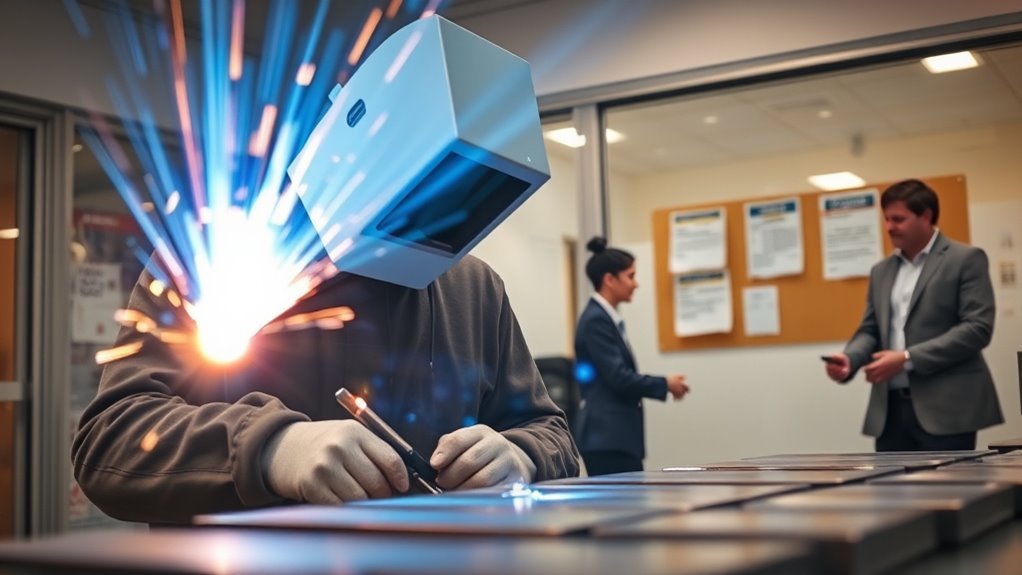You’ll pay about $20,300 in tuition and fees for ArcLabs’ welding programs, with a total cost of attendance around $40,054 when off‑campus living expenses (about $18,454) are included. All program fees are bundled in tuition, and program lengths range from 70‑hour seminars to 1,300‑hour Master Welder training. Average financial aid is $5,278, and career services support placement. Keep going and you’ll get details on budgeting, aid options, and job outcomes.
Total Cost of Attendance and What It Covers

Although the sticker price for Arclabs’ 2024–2025 academic year looks high, you’ll want to break it down to understand what you’re actually paying for.
The total cost of attendance is $40,054, which combines tuition, fees, and living costs. In a clear cost breakdown, tuition and fees for the Welding Technology/Welder program are $20,300; off-campus living costs are estimated at $18,454.
Total cost of attendance: $40,054 — tuition and fees $20,300; estimated off‑campus living $18,454.
Financial aid reduces that burden — students receive an average of $5,278 — so your net cost will depend on aid eligibility.
When you do a program comparison, note there are no additional program-specific costs listed for welding. Remember individual circumstances, like housing choices, can raise or lower your actual expense.
Tuition, Fees, and Program Options

Because Arclabs bundles all program fees into the $20,300 tuition for the 2024–2025 Welding Technology/Welder program, you can more easily compare program costs and plan your budget.
That tuition breakdown is straightforward: no listed program-specific add-ons means the quoted figure covers standard instruction and fees.
For program comparison, consider hours and depth—Advanced Welder is 900 hours, Master Welder 1,300 hours, and Specialty Seminars are 70 hours. You’ll use those measures to match time commitment with career goals.
- Compare training length to your timeline: 900 vs. 1,300 vs. 70 hours.
- Factor included fees: single tuition number reduces surprises.
- Weigh skill depth against cost and program duration.
Living Expenses and Budgeting for Off‑Campus Students

When you plan for Arclabs, include the estimated $18,454 in off‑campus living costs along with the $20,300 tuition so you know the total estimated cost of attendance — $40,054 — and can budget for housing, food, transportation, and personal needs.
You should evaluate off campus housing options by comparing rent, utilities, and proximity to campus to reduce transport costs.
Create a monthly budget that allocates realistic amounts for groceries, transit, phone, insurance, and incidentals, and track spending to avoid surprises.
Use budgeting strategies like splitting bills with roommates, choosing furnished rentals to lower startup costs, and setting an emergency buffer.
Being aware of living costs helps you make informed choices and keep overall expenses manageable while enrolled.
Financial Aid, Grants, Loans, and Average Aid Amounts

If you’re weighing Arclabs’ costs, remember that financial aid can make a real difference: students receive an average of $5,278 in aid, and about 58% got grants while 55% took out loans in 2023.
You should explore financial aid options early to reduce the $40,054 cost of attendance and the $23,944 average net price. Grants cut your need for borrowing; loans cover remaining gaps.
- Assess federal and institutional grant programs to lower out‑of‑pocket expenses.
- Compare average loan amounts and terms before accepting debt.
- Use the school’s aid office to combine grants, scholarships, and loans strategically.
That approach keeps costs manageable and clarifies your repayment responsibilities.
Career Outcomes, Job Placement, and Return on Investment

Although not every program guarantees a job, Arclabs’ high completion rate and dedicated career support mean you’ll be well positioned to enter the welding workforce quickly; with 76% of students graduating on time and most alumni moving into in-demand welding roles, the school’s $23,944 average net price often translates to a strong return on investment as graduates start earning sooner. You’ll get focused career support that connects you with employers and helps translate your job skills into hireable experience. Placement services, résumé help, and employer networks reduce job-search time, so your training converts to paychecks fast. The ROI depends on your specialty, location, and work ethic, but outcomes show a clear path from training to employment.
| Hope | Skill | Reward |
|---|---|---|
| Confidence | Practical job skills | Paychecks |
| Network | Certification | Stability |
Frequently Asked Questions
Are There Part‑Time or Evening Class Options Available?
Yes — you’ll find evening schedules and flexible options for part‑time enrollment; the school’s catalog lists specific course times, and admissions can help you tailor a plan that fits work and family commitments.
What Safety Equipment Is Required and Is It Provided?
You need standard safety gear—helmet, gloves, apron, boots, and eye protection—and the school provides many items; you’ll cover remaining equipment costs for personal or specialty gear, with clear lists and purchasing options from the school.
Can I Transfer Credits From Another Technical School?
Yes — you can often transfer credits if they meet Arclabs’ credit transfer policies; you’ll need official transcripts, course syllabi demonstrating technical school equivalency, and program director approval, so contact admissions early to confirm specifics.
Are Apprenticeship or Employer Partnerships Offered During Training?
Practical partnerships persist: yes, you’ll access apprenticeship benefits and employer partnerships during training, gaining paid, on‑the‑job experience, mentorship, and potential job placement while you complete classroom instruction and hands‑on welding competencies.
What Certification Exams Are Included in the Program Cost?
You’ll receive details on certification types included and whether exam fees are covered; typically certifications like AWS D1.1 and entry-level welder tests are listed, and the program will state if exam fees are included or separate.
Conclusion
So, is Arclabs Welding School worth the cost? You’ll want to compare total tuition and fees, plus program length, against likely starting wages and job-placement rates. Don’t forget living expenses if you’ll live off campus and factor in grants, loans, and average aid to see net cost. With clear budgeting and available financial aid, you can judge ROI pragmatically and choose the program option that meets your career goals and finances.


